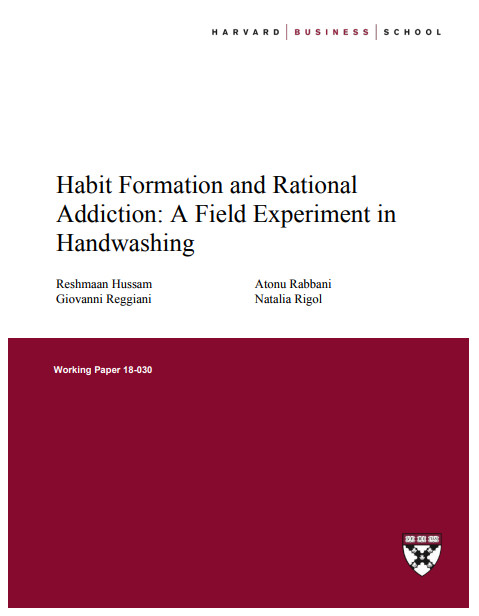Habit Formation and Rational Addiction in Handwashing
 |
rapport Sep 2017 ; 85 pages
Aut. Reshmaan Hussam & Atonu Rabbani &
Ed. Harvard University - Cambridge
Téléchargeable sous format: PdF
Téléchargeable chez l'éditeur
Abstract:
Regular handwashing with soap is believed to have substantial impacts on child health in the developing world. Most handwashing campaigns have failed, however, to establish and maintain a regular practice of handwashing.
Motivated by scholarship that suggests handwashing is habitual, we design, implement and analyze a randomized field experiment aimed to test the main predictions of the rational addiction model. To reliably measure handwashing, we develop and produce a novel soap dispenser, within which a time-stamped sensor is embedded. We randomize distribution of these soap dispensers as well as provision of monitoring (feedback reports) or monitoring and incentives for daily handwashing. Relative to a control arm in which households receive no dispenser, we find that all treatments generate substantial improvements in child health as measured by child weight and height. Our key test of rational addiction is implemented by informing a subset of households about a future boost in monitoring or incentives. We find that
(1) both monitoring and incentives increase handwashing relative to receiving only a dispenser;
(2) these effects persist after monitoring or incentives are removed;
and (3) the anticipation of monitoring increases handwashing rates significantly, implying that individuals internalize the habitual nature of handwashing and accumulate habit stock accordingly.
Our results are consistent with the key predictions of the rational addiction model and shed light on an underdeveloped dimension of decision-making essential to sustained behavioral change.
Mot clef: |
Editeur/Diffuseur: |
|
Harvard University - Cambridge - Etats Unis |
En cas de lien brisé, nous le mentionner à communication@pseau.org